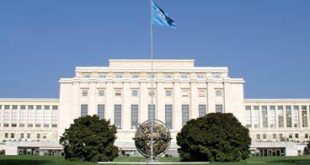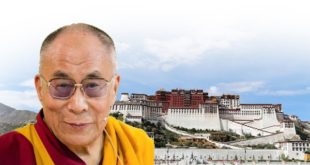VIỆN TĂNG THỐNG
90 Trần Huy Liệu, Phường 15, Quận Phú Nhuận, Saigon
| Phật Lịch 2556 |
Số 10/VTT/XLTV
|
of the Unified Buddhist Church of Vietnam
on the state of our country and the situation of human rights
We, the Bicameral Council of Institutes of the Unified Buddhist Church of Vietnam (UBCV), leaders of twenty UBCV Representative Boards from provinces and cities all over the country, senior monks, nuns and lay followers, are assembled at the Giac Hoa Pagoda for the memorial celebration of the founding Patriarch Nguyen Thieu.
As we gathered before the sacred altar of our founder and the late Patriarch Thich Huyen Quang, we examined the grave problems facing our country today. The decline in morality, an increasingly uncaring society, escalating social problems, an alarming poverty gap, a lack of individual freedoms and human rights – all these scourges are stifling the development of our countrys age-old culture and spiritual traditions. We believe that this deplorable situation is due to the factors analyzed below.
The human rights situation is abysmal. In a fierce, ongoing crackdown on freedom of expression, bloggers, Internet users, journalists, human rights defenders and pro-democracy activists have been arrested and condemned to harsh prison sentences, e.g. Điếu Cày Nguyễn Văn Hải, Tạ Phong Tần, Phan Thanh Hải, Đinh Đăng Định, Việt Khang, Trần Vũ Anh Bình, Trần Huỳnh Duy Thức, Nguyễn Tiến Trung, Lê Công Định, Cù Huy Hà Vũ, Nguyễn Văn Lía, Lê Văn Sơn, Đặng Xuân Diệu, Hồ Đức Hòa etc. Violations of religious freedom are widespread. A policy of religious intolerance, meticulously planned and orchestrated at the highest levels of the state, is implemented against all religious communities including the Hoa Hao, Cao Dai, Roman Catholics, Protestants and the Unified Buddhist Church of Vietnam. The UBCVs 20 Representative Boards in the central and southern provinces are a principal target of repression. A salient example is the Giac Minh Pagoda in Danang.
The security of our country is under threat as China inexorably extends its claims on Vietnamese sovereign waters, islands and lands. The Hanoi authorities make feeble protests for forms sake, but show not a whit of the unyielding determination of the rulers of the Dinh, earlier Le, Ly, Tran and later Le dynasties to defend our nations sovereignty against foreign aggression.
Six months ago, when Beijing printed millions of Chinese passports with a map of its territories that brazenly included the nine-dashed line on the South China Sea, Vietnam did not react. Only recently, under questions from a foreign journalist did Hanois spokesman grudgingly protest this fact.
The Beijing-Hanoi alliance dating back to Ho Chi Minhs era opened the doors to the Chinese Red Armys invasion of Vietnams islands, reefs and waters, following Pham Van Dongs diplomatic note to Premier Chu En Lai in 1958 recognizing Chinese sovereignty [of the Paracel and Spratly islands] . Beijing has used this to justify its strategic presence in the South China Sea and turn it into a kind of Asian Mediterranean which links the route between the Pacific and Indian Oceans, and could ultimately give China maritime control over the oceans as far as Africa and the Atlantic. At the Chinese Communist Partys 18th Congress this year, Hu Jintao made this ambition very clear when he stressed that the “cornerstone” of the Partys policy was to transform China into a maritime super power.
In late November this year, China published the first official map of the newly-established prefecture of “Sansha”, which asserts Chinese sovereignty over the Truong Sa, Hoang Sa and other archipelagos in the South China Sea. It includes a military garrison and an administrative capital on Woody Island, which was captured by China from the former Republic of (South) Vietnam in 1974. Sansha will be the bastion of Chinas maritime military offensive against Vietnam in the near future.
China is carefully and meticulously preparing its incursion into Vietnamese lands and seas. Yet, despite the urgent warnings and appeals of hundreds of Vietnamese personalities and intellectuals, Hanois government remains impervious. Indeed, it even seems to be conniving with China, like a Trojan horse ready to facilitate a new era of Chinese domination of Vietnam in the 21st century.
Faced with this grace threat to regional and maritime security, whilst Vietnam feigns ignorance, the international community is strongly speaking out to defend the rights of other Asian countries to the South China Seas. However, instead of seizing this lifeline of international support to reinforce its own position, Vietnam blindly clings to its relationship with China based on the “16 golden words and four cardinal principles”. Indeed, at the recent ASEAN Summit in Phnom Penh, in the debate on whether to solve the South China Sea issue bilaterally (proposed by Beijing) or multilaterally (proposed by several ASEAN and Western countries), the Hanoi delegation never said a word, letting Beijing have its way. Only the Philippines had the courage to speak out to defend its countrys rights.
In contrast, the Tibetan people have shown the example by courageously opposing their Chinese rulers and refusing to submit to tyranny. In the past three years, 81 Tibetan Buddhist monks, nuns and followers have immolated themselves to protest Chinese occupation, thus drawing world attention to their peoples voices. In November 2012 alone, 19 Tibetans self-immolated and thousands of Tibetan students and civilians demonstrated to defend their country and their Buddhist faith.
Another example is Burma. This former military junta, known for its violent repression of pro-democracy demonstrations led by Buddhist monks and civilians, is now taking its first steps towards democratic reforms. This gives Burma a chance to gradually distance itself from China by winning increased support from the international democratic community.
In the light of these observations, the Unified Buddhist Church of Vietnam earnestly appeals:
1. To the leaders of the Vietnamese Communist Party and government: to demonstrate their determination to defend Vietnams territorial integrity and their commitment to stem Chinas incursions on Vietnamese lands and seas.
First and foremost, the Party and government should internationalize the South China Sea issue by publicly declaring their support for a multilateral solution, with the participation of Vietnam, the Philippines, Malaysia, Brunei, Taiwan and China. In accordance with the 1982 UN Convention on the Law of the Sea, the provisions of the ASEAN Declaration on the Conduct of Parties in the South China Sea (DOC) and the ASEAN Code of Conduct (COC – Guidelines for Implementation of the DOC), Vietnam should bring the South China Sea issue before the United Nations, in order to stake Vietnams legitimate claims before the international community.
As a first step in this process, Vietnam should articulate the “sense of the government on the preservation of national sovereignty”. If it sincerely wants to protect our country, the government must win the support of all its 90 million population, including all political groups and religions. To achieve this, the authorities must initiate a genuine transition to multiparty democracy so they can unite the people in the fight to preserve our homeland from a new period of Chinese domination in the 21st Century.
2. To all the people and Buddhists of Vietnam: to follow in the steps of our fore-fathers who painstakingly built the great country we have inherited today by freeing ourselves from fear. After 70 years of oppression under communist rule, fear has become a second nature for the people. We must join hands, cast aside all differences of opinion, personal concerns or petty interests, and become part of a common movement of resistance to defend the homeland, inspired by the spirit of the two heroic Trung sisters in our history. By rallying together and pooling our knowledge, skills and diversities into one vibrant movement, we can win our freedom, democracy and human rights.
Over the past 70 years, the Communist Partys pervasive propaganda has deceived and divided our people, creating false rifts between North and South, communists and nationalists. Even today, these divisions remain rooted in our minds. Blinded by suspicion and distrust, we see only our differences, but we do not recognize each other for what we really are – the children of Vietnam, united by a common heritage of 4,000 years of civilization and 2,000 years of history. How can we battle against our enemies if we do not stand together? The same goes for the battle against dogmas and false ideas.
We must cast away the fear that has paralyzed our people since communism came to Vietnam. Casting away fear means drawing inspiration from our ancestors, taking their spirit as our armour, their bravery as our helmet and advancing dauntlessly in the struggle to free our people from dictatorship and guide them towards spiritual enlightenment.
Vietnam belongs to the Vietnamese people. No Vietnamese can turn a blind eye when the country is threatened by foreign aggression, endangered by the connivance of its own submissive government and threatened by the indecision and lack of resolve of a number of Vietnamese intellectuals.
The UBCV also calls upon all Vietnamese overseas to alert international opinion to the situation in Vietnam by raising your voices in the international arena. Do not let others decide Vietnams future in our place, as happened in 1954 with the Geneva Agreement and again in 1973 at the Paris Peace Accords. We call upon you to convene a worldwide Vietnamese Congress, with representatives of all the different religions, political opposition parties, civil society movements as well as eminent personalities and intellectuals to devise a common strategy for the democratization of Vietnam.
As a religious body, the UBCV does not engage in politics. However, the UBCV is ready to support any peaceful political activity genuinely aimed at protecting the country and promoting the welfare, social justice, freedom and human rights of the Vietnamese people, as enshrined in the United Nations International Convention on Civil and Political Rights to which Vietnam acceded in 1982. The UBCV also strongly encourages Buddhist lay-followers to do their part by actively engaging in the countrys political affairs in a spirit of solidarity and equality.
We can succeed in winning happiness and freedom for our people, put an end to slavery and stem the advance of foreign encroachment. The UBCV calls upon Buddhists and all Vietnamese, at home and abroad, to form an “Alliance against Foreign Aggression” to elaborate concrete actions to save Vietnam from the grave threats that it faces today, and thereby usher in an era of peace and social justice for the people of Vietnam.
On behalf of the Bicameral Council of Institutes
Unified Buddhist Church of Vietnam
(signature and seal)
Fifth Supreme Patriarch
Sramana Thich Quang Do
 Quê Me Quê Me: Action for democracy in Vietnam & Vietnam Committee on Human Rights
Quê Me Quê Me: Action for democracy in Vietnam & Vietnam Committee on Human Rights




